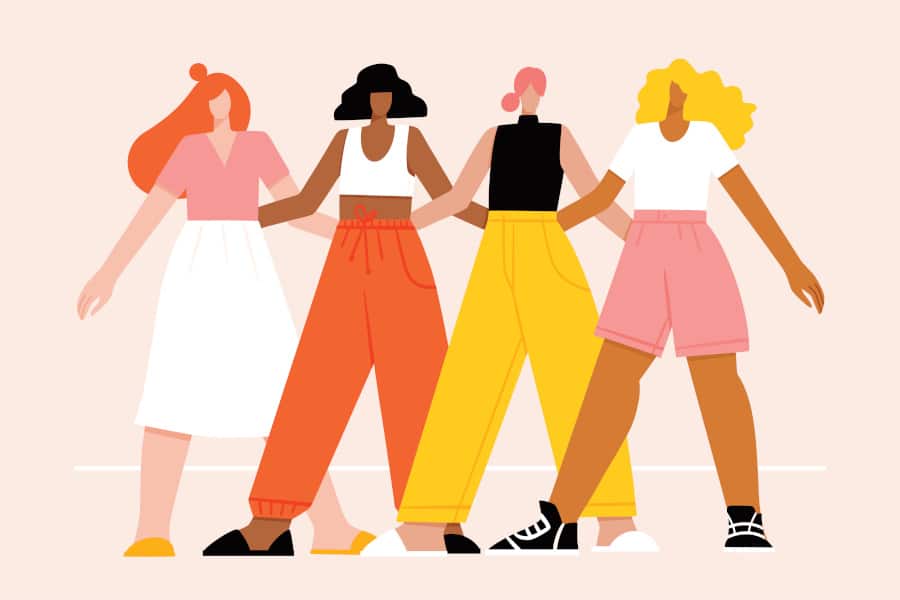Everyone has their own unique mental image of what they look like. Whether or not the picture they’ve created is accurate is another question. Body image is something that can make you feel confident and powerful or can cause you to feel awkward and anxious. Factors including diet culture, social media, and outdated beauty standards can negatively impact it. Overcoming body image issues is possible by learning to accept oneself and seeking professional help if needed.
How Is Body Image Defined?
Body image is how we see and feel about our bodies. It’s not just the image we see reflected in the mirror. It’s much more than that. Body image combines how we perceive, think about, and feel about our bodies. People will develop a positive or negative body image based on their personality, experiences, and environment.
A positive body image is when a person is comfortable and confident about their body. Even though they may not feel perfect, they accept and respect their bodies. People with a positive body image tend to have higher self-esteem and a positive relationship with food and eating. A positive body image makes one less susceptible to eating disorders.
A negative body image is when someone is uncomfortable with their body. Their dissatisfaction with their appearance causes them to struggle with accepting and respecting their body. They tend to compare themselves to others and have low self-esteem. They may engage in disordered eating behaviors and are at higher risk for developing an eating disorder such as anorexia or bulimia (1).
Who Struggles with Negative Body Image?
Anyone can have a negative body image. Struggles with body image affect people of all body sizes, ages, ethnicities, genders, and sexual orientations. Studies show that the highest occurrence of body dissatisfaction is among adolescent and young adult women and that, generally, the rate of body dissatisfaction can be as high as 75%. Although there is a connection between body dissatisfaction and the development of eating disorders, not everyone who struggles with body image will develop an eating disorder (2).
How Can You Tell If You Have a Problem with a Negative Body Image?
Many people may feel negative about their bodies and appearance from time to time, but how do you know if it’s a moment of fleeting dissatisfaction or a real problem that needs attention? If negative feelings about your body are your norm, you need to address those feelings. The following are signs that negative body image is a problem:
- Comparing yourself to others frequently and feeling inadequate
- Body checking and weighing yourself constantly
- Feeling ashamed about your body
- Trying to hide your body with baggy clothes
- Avoiding having your picture taken or posted
- Editing photos of yourself to change your appearance
- Using diet and exercise to change your body (3)
A more severe problem related to negative body image is body dysmorphia. This condition is when an individual is preoccupied with a perceived flaw in their appearance, even if it isn’t there or others don’t notice it. Body dysmorphic disorder (BDD) is a severe condition that, much like an eating disorder, can negatively affect mental health, relationships, and daily life. People with BDD may experience low self-esteem, self-loathing, isolation, anxiety, depression, and suicidal thoughts (4).
How Do Social Media and Editing Apps Impact Body Image?
Social media platforms are doing quite a bit of damage to people’s body image. Users are bombarded with pictures of “perfect-looking” people, leading them to compare themselves to unrealistic and unattainable beauty standards. The prolific use of filters and editing apps is completely deceiving. Even though so many images found on social media are altered, they still lead to people judging their bodies and feeling dissatisfied with their appearance (5).
How Can Someone Overcome Struggles with Body Image?
If you are struggling with your appearance, finding ways to foster a positive body image is crucial. The following are some ways to help improve your self-esteem, self-worth, and body image:
- Avoid negative self-talk and start positive self-talk
- Spend time with body-positive people
- Wear clothes you feel good in
- Follow body-positive influencers on social media and unfollow accounts that damage self-esteem and body image
- Frequently remind yourself that you are more than just your appearance; you are a whole individual
- Write a list of things about your body you are grateful for
- Pursue an activity or hobby that helps you feel good about yourself
- Seek counseling from healthcare professionals such as psychiatrists or therapists (6)
If you have body image struggles or think you may have signs of an eating disorder, take the first step in getting help and reach out to our highly trained and dedicated staff at Toledo Center. We are here to provide you with the guidance and support you need to begin your journey toward eating disorder recovery. Contact the team at 419-885-8800 to find out more about our unique programming.
References
- National Eating Disorders Collaboration. (n.d.). Body image. Retrieved September 10, 2023, from https://nedc.com.au/eating-disorders/eating-disorders-explained/body-image/
- Hosseini, S., & Padhy, R. (2023, February 12). Body image distortion. National Library of Medicine. https://www.ncbi.nlm.nih.gov/books/NBK546582/
- Krouse, L. (n.d). Understanding body image struggles. The Jed Foundation. Retrieved September 10, 2023, from https://jedfoundation.org/resource/understanding-body-image-struggles/
- Mayo Clinic. (2022, December 13). Body dysmorphic disorder. https://www.mayoclinic.org/diseases-conditions/body-dysmorphic-disorder/symptoms-causes/syc-20353938
- Pedersen, T. (2021, February 27). How does social media affect body image? PsychCentral. https://psychcentral.com/health/how-the-media-affects-body-image#negative-effects
- Brazier, Y. (2023, May 25). What is body image? Medical News Today. https://www.medicalnewstoday.com/articles/249190#tips
Author bio:
Kate Delaney Chen, BSN, RN-BC is a healthcare writer and registered nurse with over 17 years of bedside experience. She specializes in Psychiatric Nursing and Nephrology and currently works at a nationally recognized Inpatient Eating Disorders Program.


